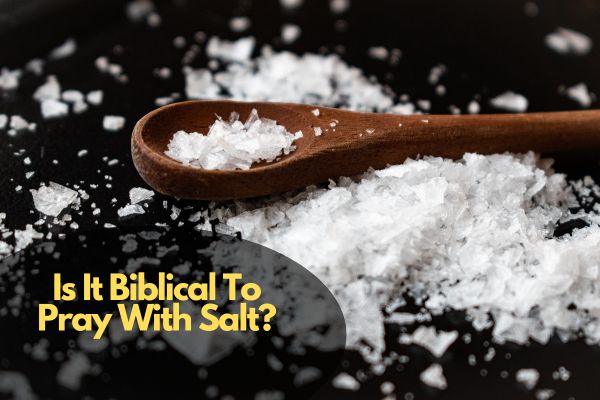The practice of praying with salt dates back centuries and can be seen in a variety of cultures and religions. However, in the context of Christianity, the question arises: is it biblical to pray with salt? Join us let’s uncover how and why salt finds its way into prayerful hands, what meaning it portrays, and its practical applications in prayer.
Is it biblical to pray with Salt?
The Bible references salt in a variety of places, frequently assigning metaphorical meanings to it. I consider that as a definite answer Yes! it is biblical to pray with salt.
Biblical References to Salt
Here are some important examples and bible verses:
Covenant
Salt was used in sacrifices and offerings to represent God’s everlasting covenant with his people. In Leviticus 2:13, it is written, “Season all your grain offerings with salt. Do not leave the salt of the covenant of your God out of your grain offerings; add salt to all your offerings.” This verse suggests that salt was an integral part of offerings, representing a covenant with God.
Purification
Salt was utilized in cleansing ceremonies to symbolize purity and ward off evil. (Numbers 8:7). Using salt during prayer might represent devotion to God and adherence to His covenant. Praying with salt, like its metaphorical use in purification rites, can be interpreted as a technique to cleanse a room or person of negativity and demonic forces.
Wisdom
Jesus compared his students to “the salt of the earth,” highlighting their importance in sustaining and flavoring the world. (Matthew 5:13). According to Jesus’ metaphor, praying with salt could symbolize a desire to be a source of wisdom and constructive influence in the world.
Salt in the Bible: Symbolism and Significance
Salt holds significant symbolism and spiritual significance throughout the Bible, representing various concepts and principles. Understanding the symbolic meaning of salt can deepen our appreciation for its significance in biblical narratives and teachings. Here are some key aspects of salt symbolism in the Bible:
Purification and Preservation
Salt was commonly used in the ancient world as a purifying agent and preservative. In Leviticus 2:13, God instructs the Israelites to include salt in their grain offerings as a symbol of the covenant of salt, signifying a perpetual agreement and preservation. This association with purification and preservation highlights salt’s enduring nature and its ability to ward off corruption and decay.
Flavor and Influence
Salt is renowned for its ability to enhance the taste of food. In Matthew 5:13, Jesus refers to His followers as the “salt of the earth,” emphasizing their role in bringing godly influence and adding spiritual “flavor” to the world. Like salt, believers are called to bring goodness, grace, and moral integrity to their interactions with others, influencing them positively and pointing them toward God.
Covenant and Commitment
Salt is linked to the concept of covenant in several instances. In the Old Testament, the use of salt in offerings and sacrifices symbolized the enduring nature of God’s covenant relationship with His people (Numbers 18:19). It represented the faithfulness, loyalty, and commitment expected from both parties in the covenant.
Healing and Cleansing
Salt’s purifying properties are also associated with healing and cleansing. In 2 Kings 2:19-22, Elisha used salt to purify a polluted water source, demonstrating its cleansing power. This narrative highlights salt’s ability to bring restoration and renewal, both physically and symbolically.
Wisdom and Seasoning
Jesus encourages His disciples to be “salted with fire” in Mark 9:49, indicating the transformative work of the Holy Spirit in their lives. This reference suggests that believers should embody wisdom, discernment, and spiritual maturity, seasoning their interactions with grace and truth.
Hospitality and Friendship
Salt is linked to hospitality and friendship in the Bible. In Luke 14:34-35, Jesus cautions against losing the salt’s flavor, which would render it useless. This metaphor implies that believers should exemplify genuine hospitality and maintain the qualities that attract others to Christ.
Practical Applications of Salt in Prayer
While the Bible does not prescribe using salt in prayer, some individuals may find personal significance and derive spiritual meaning from incorporating salt into their prayer practice. Here are a few practical applications of salt in prayer that some people may choose to explore:
Symbolic Remembrance: Some individuals may choose to use a small dish of salt as a visual symbol during prayer. As they pray, they can reflect on the symbolic meanings of salt discussed earlier, such as purification, preservation, and covenant. The presence of salt can serve as a tangible reminder of these concepts and help focus their thoughts and intentions during prayer.
Purification and Surrender: Salt can be used as a symbol of purification and surrendering oneself to God. As individuals pray, they might envision the salt cleansing their hearts and minds, purifying them from negative thoughts, attitudes, and distractions. It can represent a willingness to surrender personal desires and align one’s will with God’s purposes.
Covenant Renewal: Salt can be a visual representation of the covenant relationship between believers and God. During prayer, individuals may reflect on their commitment to God’s covenant, expressing gratitude for His faithfulness and recommitting themselves to live in obedience and faith. They may use salt as a reminder of the enduring nature of this covenant and their desire to remain faithful to it.
Prayer Walks and Anointing: Some individuals may choose to incorporate salt into prayer walks or anointing rituals. They may sprinkle salt along the path they walk, symbolizing the spreading of God’s influence, grace, and blessings. Similarly, salt can be applied in an anointing ceremony, signifying consecration and seeking God’s presence and power in a specific area or situation.
Metaphorical Reflection: During prayer, individuals may use salt as a metaphorical reflection tool. They can consider how they are called to be the “salt of the earth” and pray for wisdom, discernment, and the ability to influence their surroundings positively. They can also reflect on their spiritual “flavor” and ask God to help them exemplify the qualities of salt in their interactions with others.
Practical Applications and Caution
While the symbolic use of salt in prayer aligns with biblical themes, it’s crucial to approach such practices with discernment. The Bible does not explicitly command the use of salt in prayer rituals. Instead, it encourages heartfelt, sincere communication with God.
Praying with salt should be viewed as a personal expression of faith rather than a mandated ritual. Moreover, the focus should always remain on the spiritual intention behind the act rather than the material substance used.
Conclusion
Praying with salt is not specifically mandated or recommended in the Bible. Salt carries symbolic weight in Scripture, representing purification, preservation, and the transformative influence of believers in the world. However, prayer primarily involves heartfelt communication with God, rooted in faith, sincerity, and a genuine relationship.
While personal practices that incorporate salt may hold personal significance, they should be recognized as expressions of faith rather than biblical mandates. It is essential to maintain a balanced perspective, avoiding superstition or legalism, and focusing on the core principles of prayer outlined in the Bible..






